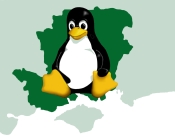|
|
imported from wiki, 25 November 2006
Introduction
In the words of the manpage, “Screen is a full-screen window manager that multiplexes a physical terminal between several processes (typically interactive shells).”. What? Well basically what screen allows you to do is run one or more applications in a terminal session which can be ‘disconnected’ so that it runs in the background. This is different from simply backgrounding a running process because you can retrieve a screen session easily and get full interactive control over it again. OK, you can regain interactive control of backgrounded processes too, using the fg command, but this approach isn’t suitable [continued…]
imported from wiki, 23 November 2006
Introduction
Most of the information contained herein has been lifted from an email sent to the list. I hope it will be of use to some of you when you consider compiling an application from source. I’ve expanded it.
Prerequisites
I assume that you have the necessary base tools for compiling programs. Although:
debian: apt-get install build-essential patchrpm-based: rpm -i glibc-devel gcc g++
are the most likely packages you’ll need as a base. But this doesn’t include any of the source packages (such as other libs) that the application you’re going to compile relies [continued…]
imported from wiki, 19 November 2006 LPI-C
Linux Professional Institute – Certification
The LPI is an open vendor neutral institute offering exams and certification worldwide. They do not offer training directly, rather a syllabus, and exams via partner organisations. It is up to the candidate to obtain their own training via any third party, and then sit the exams independently. Several training companies offer courses tailored for the LPIC exams, and there are a wide number of book and web sites that provide teaching and self help guides.
There are two exams for the level I certification (introductory), 101 and 102, and two [continued…]
imported from wiki, 5 November 2006
When: 10:30 – 16:30, Saturday 4th November 2006
Where: ParkHallChurchHall
Gallery: http://www.hants.lug.org.uk/gallery/HantsLUG_11_2006
[[TechTalks]]
- Adrian Bridgett on “Troubleshooting Tools” (strace, netstat, tcpdump etc)
Media from the talk are available on the TechTalks/4thNovember2006 page.
Who Was There
imported from wiki, 22 October 2006 Desktop Adapted for Dad
“DAD”
The ideas in this page came from my project to give my retired father a computer running Debian Sarge. All the ideas can be transplanted to any modern Linux distribution, and most of these ideas should work with any desktop system. I used KDE and found it easy to configure, others will no doubt add comments on the other desktop systems.
Introduction
My father is in his late 60s, and has never used a computer before, though he has seen others use them. There are a lot of people that now fall [continued…]
imported from wiki, 21 October 2006
When: 10:30 – 16:30, Saturday 2nd September 2006
Where: ParkHallChurchHall
[[TechTalks]]
You’ll find slides, video and other media from the talks on the TechTalks/2ndSeptember2006 page.
Who was there
imported from wiki, 17 October 2006
Debian uses /etc/network/interfaces to configure network interfaces to request an IP address from a DHCP server with a line like:
iface eth0 inet dhcp
However if you are using a PCMCIA card as your NIC you should also check your /etc/pcmcia/network.opts file and ensure that there is a line DHCP=”y” and that there is no setting for a static IP address.
A static IP address setting is likely to be found in this file if the Laptop has been setup to use a static IP address prior to wanting to use a DHCP server. The /etc/pcmcia/network.opts file [continued…]
imported from wiki, 14 October 2006
Introduction
Usually when one gets some new hardware (say, a new hard drive) they want to use it, and replace their old one. But just how does one go about copying/creating partitions on the new drive, and then copy the data across safely? It’s not quite as simple as a “cp” command….
The Theory
If you are copying from one filesystem to another, they both have to be mounted. However, you can’t mount both the old and the new filesystem on the same place, as you will only be able to see one of them.
The [continued…]
imported from wiki, 11 October 2006
When: 10:30 – 17:00, Saturday 4th October 2003 Where: Seminar Room 1, Building 59 (Zepler), Department of Electronics & Computer Science, Southampton University.
<b>Who was there:</b>
imported from wiki, 7 September 2006
The Cobalt RaQ Cobalt_RaQ is a 1U rackmount server product line developed by Cobalt Networks, Inc. which was later purchased by Sun Microsystems featuring a modified Red Hat Linux operating system with a proprietary GUI for server management. Original RaQ systems were equipped with MIPS CPUs but later models used AMD K6-2 chips and then eventually Intel Pentium III CPUs for the final models.
The following guide has only been tested on a Cobalt RaQ4 and may not work on all machines. However it should also work on RaQ 3/XTR/550 and the [continued…]
|
|
